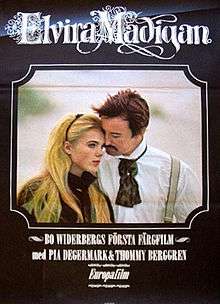Elvira Madigan (1967 film)
| Elvira Madigan | |
|---|---|
 | |
| Directed by | Bo Widerberg |
| Produced by | Waldemar Bergendahl |
| Written by |
Screenplay: Bo Widerberg Ballad: Johan Lindström Saxon |
| Starring |
Pia Degermark Thommy Berggren |
| Cinematography | Jörgen Persson |
Release dates | 24 April 1967 |
Running time | 91 minutes |
| Country | Sweden |
| Language |
Danish Swedish |
| Box office | $2,100,000 (US/ Canada)[1] |
Elvira Madigan is a 1967 Swedish film directed by Bo Widerberg, based on the tragedy of the Danish tightrope dancer Hedvig Jensen (born 1867), working under the stage name of Elvira Madigan at her stepfather's travelling circus, who runs away with the Swedish nobleman lieutenant Sixten Sparre (born 1854).
Plot
Elvira Madigan and Sixten Sparre are together in the Danish countryside. Sixten has renounced the military and now claims to be "on the women's side." Elvira, who was the main attraction at her circus, has got her identity back and starts to refer to herself with her real name Hedvig.
A friend from Sixten's regiment tries to persuade him to come back, but fails. They have no money or future and try to fish and earn money the best they can. Hedvig sells a picture of herself drawn by Toulouse-Lautrec and is paid to entertain a party with her dancing. But the situation becomes more desperate, and finally they see death as their only option.
Cast
- Pia Degermark - Hedvig Jensen, "Elvira Madigan"
- Thommy Berggren - Lt. Sixten Sparre
- Lennart Malmer - Kristoffer
- Cleo Jensen - Cleo
- Yvonne Ingdal - Elvira Madigan's voice
Soundtrack
The soundtrack features Géza Anda[2] playing the Andante from Piano Concerto No. 21 in C by Mozart,[3] which is sometimes referred to as the "Elvira Madigan" Concerto; as well as Vivaldi's Four Seasons.
Anda's Deutsche Grammophon LP of Concerto No. 21 was re-issued with a cover showing Pia Degermark in costume in a still from the film.[4]
Awards and nominations
- BAFTA Awards
- Best Cinematography (Persson, nominated)
- Most Promising Newcomer to Leading Film Roles (Degermark, nominated)
- Cannes Film Festival
- Best Actress (Degermark, won)
- Golden Palm (Widerberg, nominated)[5]
- Golden Globe Awards
- Best Foreign-Language Foreign Film (nominated)
- Most Promising Newcomer - Female (Degermark, nominated)
- National Board of Review
- Best Foreign Language Film (won)
Critical responses
An unnamed reviewer in the Time Out Film Guide writes: "Candidate for the prettiest pic ever award. ... you may be enchanted by it if you don't laugh yourself sick."[6] Describing it as breathing the "hippie mid-sixties", Edgardo Cozarinsky writes: "Though the lovers are there as early instances of drop-outs, and several contemporary readings effortlessly emerge, Widerberg's real concern is with the sensuous presence of cream and berry juice on lips and fingertips". For Widerberg, "this affirmation in the face of death carries ... the weight of a modest but combative ideological point".[7]
See also
References
- ↑ "Big Rental Films of 1968", Variety, 8 January 1969 p 15. Please note this figure is a rental accruing to distributors.
- ↑ IMDb: Elvira Madigan (1967)
- ↑ Small, Allan (1996). Alfred's Basic Piano Library: Classic Themes Level 5. Alfred Publishing Co., Inc. pp. 12, 13. ISBN 0-7390-0356-9.
- ↑ Géza Anda, Mozart, Piano Concertos 17 & 21
- ↑ "Festival de Cannes: Elvira Madigan". festival-cannes.com. Retrieved 2009-03-08.
- ↑ Time Out Film Guide 2009, 2008, Time Out Guides, p312; Time Out Chicago website.
- ↑ Edgardo Cozarinsky "Bo Widerberg and Swedish Cinema since 1960", in Richard Roud (ed) Cinema: A Critical Dictionary: The Major Film-Makers, Volume Two, Kinugasa to Zanussi, 1980, London: Secker & Warburg, p1077
External links
- Elvira Madigan at the Internet Movie Database
- Elvira Madigan at the Swedish Film Institute Database

- Chicago Sun-Times review